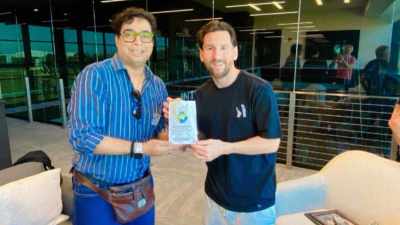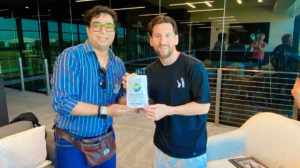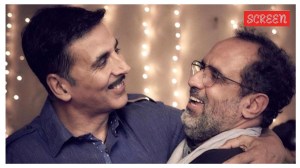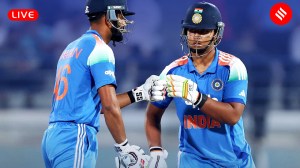How can BTech graduates with a low GPA excel in research-oriented engineering careers? An IIT Bombay alumnus explains
After getting past the JEE, the second problem that arises is that of herd mentality. While selecting their major, most students do not select their branch because they have an interest in that particular field. The decision is usually driven by which branch and college offers the highest salary during campus placements, writes Amogh Meshram.
 As a student at IIT Bombay, I had a very poor academic performance, I was last among all my classmates in my batch of Chemical Engineering, says Amogh Meshram. (Graphics by Abhishek Mitra)
As a student at IIT Bombay, I had a very poor academic performance, I was last among all my classmates in my batch of Chemical Engineering, says Amogh Meshram. (Graphics by Abhishek Mitra) — Amogh Meshram
(‘A Lesson from IIT‘ is a weekly column by an IIT faculty member on learning, science and technology on campus and beyond. The column will appear every Friday. This week, we have a doctoral student writing for us)
The education system in India gives high importance to a student’s academic performance, which is based on theoretical examinations. Students usually pass these by rote learning — a practice that begins in schools. With the infrastructure and staff that we have at the moment, very few schools can teach students to learn in a practical and meaningful manner.
The typical path of an engineering aspirant is the following: join coaching institutes, mug up all the concepts of Physics, Chemistry, and Math, try to clear the Joint Entrance Examination, and try to get into IITs/NITs. Until this point, most students are already habitual of the rote learning loop (Exam preparation – Appear for the Exam – Forget the lessons learned for the exams). The problem of rote learning is usually accompanied by the glorification of insignificant achievements. Display of photos of students cracking IIT-JEE/NEET in every newspaper and public hoardings and other coaching industry marketing strategies are all examples of the glorification of rote learning.
After getting past the JEE, the second problem that arises is that of herd mentality. While selecting their major, most students do not select their branch because they have an interest in that particular field. The decision is usually driven by which the branch and college offers the highest salary during campus placements. For example, every aspirant wants to pursue computer science engineering at IIT Bombay.
The reality hits most students as they start their engineering studies. They find out that rote learning methods are no longer useful. Some students adjust to the new way of applied learning while the majority find it uncomfortable to adjust to this approach. Their academic performance takes a toll. As a result of the herd mentality, most students then lose interest in engineering and decide to pursue a non-core career after they graduate. Once their interest in engineering is lost, most students quickly turn to extracurricular activities on campus, non-core internships, among other things, to gain experience and decorate their resumes to ultimately get a job offer in the campus placements. IITs/NITs follow a very rigorous theoretical curriculum of engineering, but they are lacking the support system and blueprint to guide undergraduate students to transition into a career in research and core industry.
As a student at IIT Bombay, I had a very poor academic performance, I was last among all my classmates in my batch of Chemical Engineering. My grades were so poor that I was assured by my peers that I would not succeed in life even in non-core jobs. The only way I could make a living, they said, would be to use my IIT-Bombay tag and teach in coaching institutes. However, today, I am working on some of the most cutting-edge engineering projects in collaboration with the iron and steel industry along with the United States Department of Energy. Following are some suggestions to help current and future undergraduate students who may have a lower GPA but still want to pursue a career in research and core industry.
The first and most important thing that an undergraduate student can do is to start working on small research projects as soon as possible, which may usually involve a literature review with professors on campus. Students must choose the topic of research themselves and work on a topic that they enjoy working on. To find a topic of interest, students should do due diligence to find out what the current research trends in industry and academia are.
After getting exposed to research, students should aim to contribute to journal publications, which can be done by assisting the current PhD students on campus in their research. They can, for example, take up the responsibility of completing certain tasks related to their research articles. This should be followed by pitching new research ideas and improvements in the current research work. Some students even get internship offers from universities in the USA or Europe by following the strategy of proposing research ideas to professors and working on those ideas during summer breaks. Students should also try to attend industry or academic conferences and showcase their work via posters or conference proceedings along with networking with potential employers or research groups for pursuing higher education.
During my undergraduate days, I did not give up on engineering against all odds. My lower GPA was a blessing as it separated me from the herd. Following the strategy mentioned above, I managed to do a research internship at Aristotle University of Thessaloniki, Greece in the summer of 2014. There I worked on learning the characterisation methods used for research in chemical engineering. I also worked on creating awareness of biogas technology in rural areas of India with the Centre for Technology Alternatives for Rural Areas at IIT Bombay, which gave me exposure to a real-world problem that industries are working on. I then proposed my research ideas to Prof. Sanjay Mahajani and Prof. Jayesh Bellare with whom I worked on biogas purification using membrane technology to complete my master’s thesis. I was able to showcase my work in front of world leaders and industrialists at the industry-academia symposium at the Make in India week in Bandra Kurla Complex in Mumbai.
Despite a low GPA in my undergraduate days, today I am working on making the first Hydrogen Direct Reduction Reactor and pilot plant for ironmaking in America. Why? Because pursuing a career in research and development requires practical hands-on experience and real-world problem-solving skills that students cannot learn in the classroom from theoretical rote-learning methods. Pursuing a career in a core industry is not difficult if you give up theoretical rote learning habits, stop following the herd mentality, and start following your path of solving real-world engineering problems with meaningful and applied learning.
(The writer is a doctoral student at the Arizona State University)
- 01
- 02
- 03
- 04
- 05
































